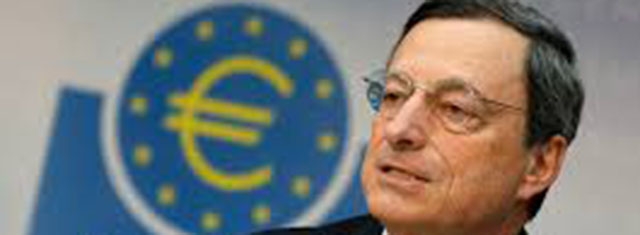Politics
ECB-MARIO DRAGHI CONFIRMS QE IS ALREADY WORKING
NEW JOBS IN NEAR FUTURE

Mario Draghi
USPA NEWS -
The quantitative easing program launched this week by the European Central Bank was already at work protecting eurozone states from contagion amid uncertainty about Greece's financial plight, the ECB's president said Wednesday.
Mario Draghi said that economic indicators were already showing "positive" signs that the trend towards persistent sluggish growth in the eurozone was being reversed.
This helps to demonstrate that the ECB was "capable of stabilizing inflation and will do so", he said. The QE program, which began Monday, is aimed at encouraging growth and demand with the goal of raising inflation levels in the eurozone from near zero back to the ECB's target of just under 2%.
The QE program will also be "extraordinarily effective" at stimulating growth and demand, said Italy's Economy Minister Pier Carlo Padoan.
This helps to demonstrate that the ECB was "capable of stabilizing inflation and will do so", he said. The QE program, which began Monday, is aimed at encouraging growth and demand with the goal of raising inflation levels in the eurozone from near zero back to the ECB's target of just under 2%.
The QE program will also be "extraordinarily effective" at stimulating growth and demand, said Italy's Economy Minister Pier Carlo Padoan.
It is already having some impact on the exchange rate, devaluing the euro to a level that Padoan said was consistent with long-term expectations.
In comments to a Senate committee, he added that it was "normal" that the euro has fallen in comparison with the US greenback, given the strength in the United States economy.
The euro was trading as low as $1.06US late Wednesday morning, near a 12-year low. Investments of some 700 billion euros will be needed to bring the eurozone economy back to its pre-crisis levels, Padoan added.
In comments to a Senate committee, he added that it was "normal" that the euro has fallen in comparison with the US greenback, given the strength in the United States economy.
The euro was trading as low as $1.06US late Wednesday morning, near a 12-year low. Investments of some 700 billion euros will be needed to bring the eurozone economy back to its pre-crisis levels, Padoan added.
For Italy, the combination of QE, a new 300-billion-euro-plus investment plan from the European Commission's President Jean-Claude Junker, and the government's structural reforms will together boost the country's economy, Padoan said.
These programs working in unison will "not only stimulate more growth but...will lead to more job creation than would have been otherwise," he said.
Italy has been among the most hard-hit, with the economy shrinking by 0.4% in 2014, according to national statistic agency Istat. Italy has not registered positive economic growth for 14 quarters - since the second quarter of 2011. Forecasts for this year are only a little better with the most optimistic predicting no more than 0.6% growth.
These programs working in unison will "not only stimulate more growth but...will lead to more job creation than would have been otherwise," he said.
Italy has been among the most hard-hit, with the economy shrinking by 0.4% in 2014, according to national statistic agency Istat. Italy has not registered positive economic growth for 14 quarters - since the second quarter of 2011. Forecasts for this year are only a little better with the most optimistic predicting no more than 0.6% growth.
But Padoan also warned that fast action is essential and the Juncker plan won't be up and running quickly enough. Countries have been contributing to the Juncker plan, but it will take "a few months" to implement, said Padoan, who called for private investments built on public spending as leverage.
Liability for this article lies with the author, who also holds the copyright. Editorial content from USPA may be quoted on other websites as long as the quote comprises no more than 5% of the entire text, is marked as such and the source is named (via hyperlink).





